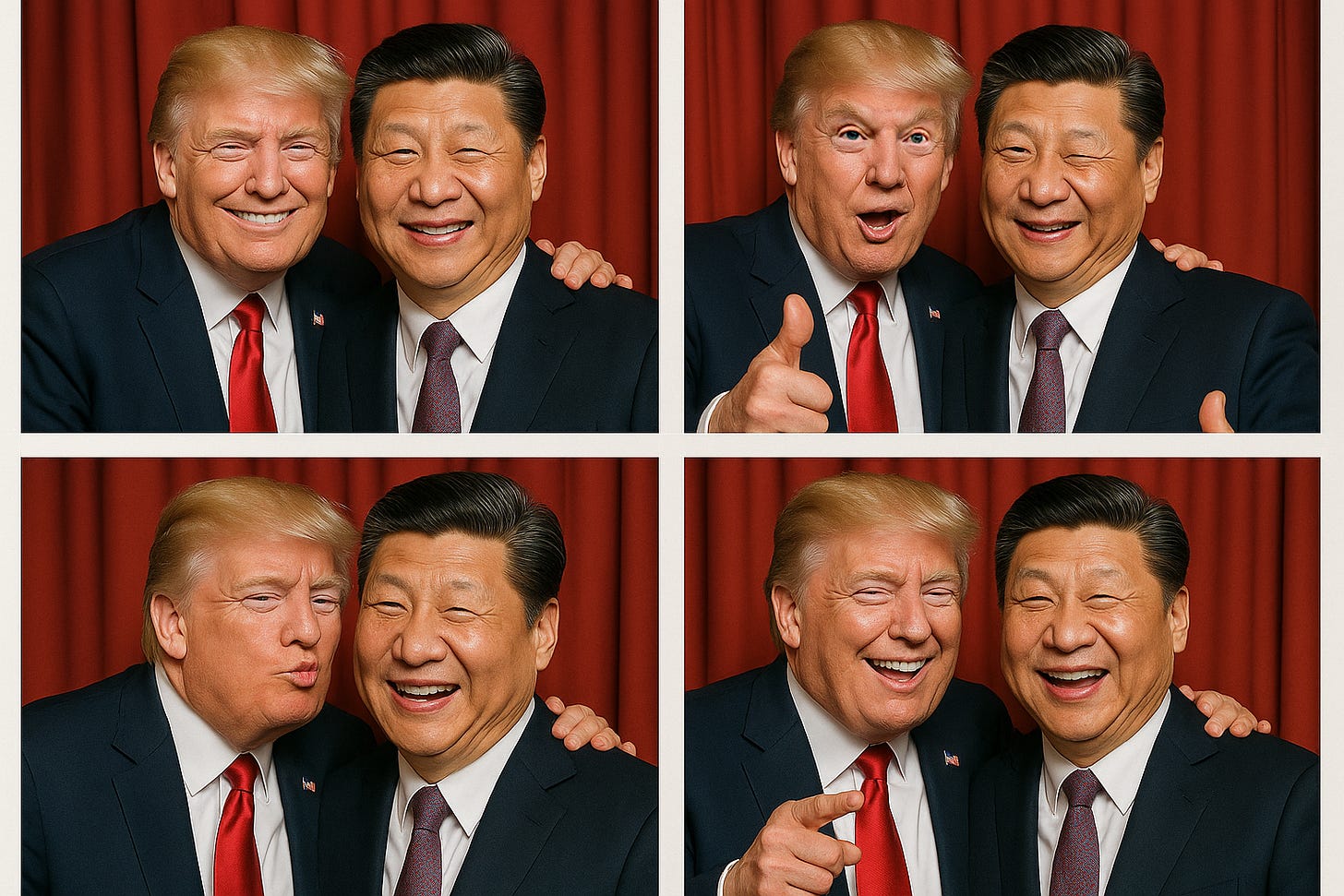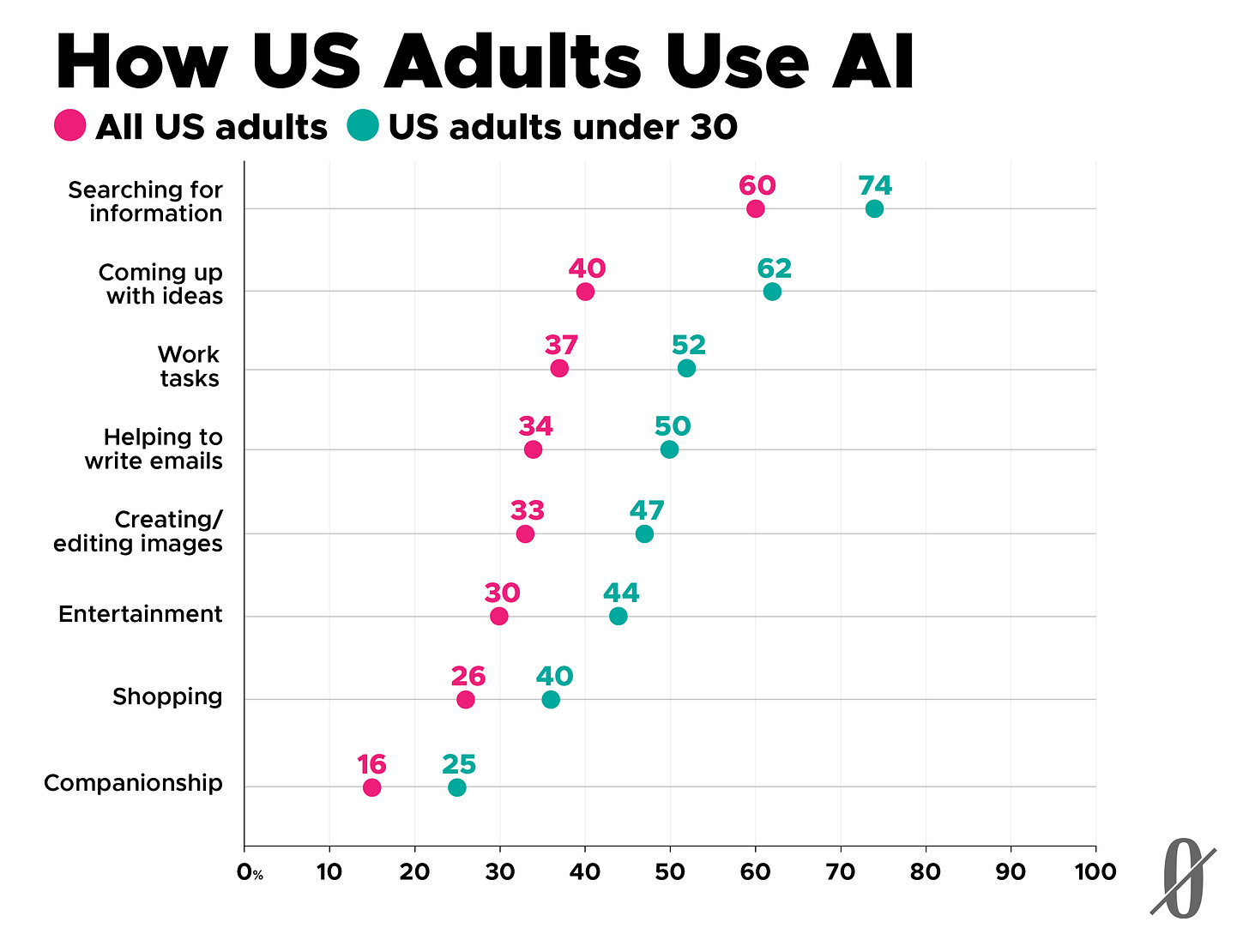Trump the China Dove?
China’s AI action plan, Americans’ AI addiction, Trump vs CBS, Thailand-Cambodia ceasefire, and more!
—President Trump prevented Taiwan’s president from making an unofficial visit to New York on his way to Central America, breaking with the US tradition of allowing these “stopover” trips despite opposition from China. While hawkish analysts framed the move as a dangerous concession to Beijing, Paul Triolo of the Albright Stonebridge Group praised it as a “step to avoid an unnecessary provocation at a sensitive time in US-China relations.” In June, Trump cancelled a US meeting with Taiwan’s defense minister in order to avoid undermining trade talks with China, the Financial Times reports.
—Officials from the US and China met in Stockholm for a round of trade talks that Treasury Secretary Scott Bessent described as “constructive.” Chinese state media said the meeting “sent a positive signal” and suggested that a future trade deal could boost US exports to China. While the talks didn’t produce concrete results, the upbeat rhetoric signals “mutual interest in creating the conditions for a leader-level meeting” in which a final deal could be reached, according to Patricia Kim of the Brookings Institution.
—An expected meeting between Trump and Chinese President Xi Jinping later this year could inaugurate a friendlier phase in US-China relations, argues eminent foreign policy scholar Graham Allison. Trump, who has praised Xi and signaled a willingness to reduce US support for Taiwan, hopes to reach a comprehensive agreement that would buoy the American economy and strengthen his credentials as a master dealmaker, Allison writes. “[I]t is even possible to imagine that this summit will announce the foundation of a new relationship—maybe even a ‘partnership’—between the two nations.”
In Trump’s first term in office, he designated 10 groups as foreign terrorist organizations (FTOs). Six months into his second term, Trump has already added 11 more, including cartels and gangs. Amid this ongoing expansion of the definition of “terrorism,” NZN Managing Editor Connor Echols put together a handy guide to help readers avoid committing any accidental acts of terror.
Are You a Terrorist?
Today, you can buy recreational cannabis in 24 US states. For Americans living in the rest of the country, you’ll have to find a dealer. As the managing editor of an upstanding newsletter, I can’t help you with that. But I can offer one piece of advice: Before buying anything, you should be 100 percent sure that your dealer didn’t get their supply from a cartel.
—Chinese Premier Li Qiang called for the creation of an international organization to promote cooperation on AI development and regulation, arguing that the world should “form a global AI governance framework that has broad consensus as soon as possible.” The “AI Action Plan” released by the Trump administration eight days ago emphasized the need to “counter Chinese influence in international governance bodies” and to establish America’s “global dominance in artificial intelligence.” George Chen of the Asia Group said, “China clearly wants to stick to the multilateral approach while the US wants to build its own camp.”
—Most Americans under 30 use AI to search for information and to brainstorm, according to a new AP poll. Among young adults who reported having used AI, 65 percent said they use it to help come up with ideas at least a few times a week. And 37 percent of all US adults say they use AI for work. A bit more than two years ago, in March of 2023, only 18 percent of Americans said they’d tried ChatGPT (which was then the only large language model getting much use) for any purpose.
—AI is replacing entry-level “grunt work” across a range of industries, worsening unemployment among recent college graduates and eroding traditional training pipelines, the Wall Street Journal reports. In both the US and the UK, postings for entry-level jobs that require a college degree are falling while applications from recent grads are rising, according to the Financial Times. In contrast to the Journal’s emphasis on AI, the FT argues that other factors, like economic uncertainty and a “post-Covid retrenchment,” are playing “an equal or bigger role” in the hiring slowdown.
—As a condition for the sale of Paramount to David Ellison (son of tech billionaire and Trump ally Larry Ellison), the Federal Communications Commission mandated that Paramount have an “ombudsman” monitor subsidiary CBS for political bias in news coverage, the Financial Times reports. One FCC commissioner who voted against the merger called it “a dark chapter in a long and growing record of abuse that threatens press freedom in this country.” David Ellison also reportedly seeks to buy the Free Press, a prominent anti-woke and pro-Israel media startup run by Bari Weiss, for more than $200 million.
—The liberal messaging group Media Matters may have to shut down under the pressure of lawsuits brought by Elon Musk and investigations launched by Trump’s Federal Trade Commission and some Republican state attorneys general, the New York Times reports. Facing $15 million in legal fees—largely a result of libel suits filed by Musk in venues ranging from the US to Singapore to Ireland—the nonprofit has cut staff and scaled back its scrutiny of Musk and the administration.
—The US and China are both claiming credit for a ceasefire between Thailand and Cambodia, following days of clashes that killed 43 people and displaced another 300,000. President Trump, who had threatened to cancel trade talks with both countries unless the fighting stopped, declared himself the “President of PEACE.” China, which dispatched diplomats to assist with ceasefire talks and held a follow-up summit in Shanghai, bestowed no comparable title on itself but did say in a statement that both sides appreciated Beijing’s “positive role in de-escalating the situation.”
—“Accelerationists” like Sam Altman may consider superhuman AI inevitable, but technology is always “the product of deliberate human choices,” argues journalist Garrison Lovely in the Guardian. Though companies are naturally driven by commercial incentives, governments “care about things like employment, social stability, market concentration, and, occasionally, democracy”—and can constrain technology in accordance with these concerns. Lovely cites as an example the 1989 Montreal Protocol, an international treaty that bans the use of ozone-depleting chlorofluorocarbons.
—In Aeon, historian David Van Reybrouck argues that the prevailing approach to climate change and other transnational problems—multilateral negotiations among national governments—falls “painfully short” of what the planet increasingly needs. “We have to start thinking about levels of diplomacy that … prioritize the interests of the Earth system above all national considerations.” He recommends international citizens assemblies modeled on the Global Assembly, which gathered 100 non-politicians from around the world and produced a report on global environmental problems in 2022.
Graphics, banners and images by Clark McGillis.











Maybe I’m missing something, but it seems like this deal with China is going to be a repeat of Reagan’s trade deal with Japan—or something along those lines. It might shift some numbers around, but it won’t actually address the deeper political and economic inequalities in the U.S. that so many pundits link to China-U.S. trade relations.